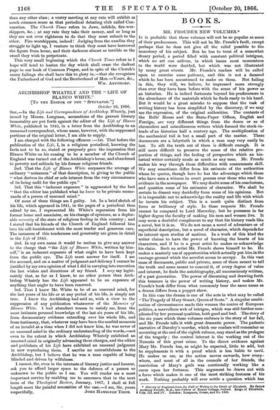ARCHBISHOP WHATELY AND THE "LIFE OF BLANCO WHITE."
[To THE EDITOR OF THE "SPECTATOR."] October 16, 1866. SIR,—In the Life and Correspondence of Archbishop Whately, just issued by Messrs. Longman, accusations of the gravest literary immorality are put forth against the editor of the Life of Blanco White, published in 1845, in a letter from the Archbishop to an unnamed correspondent, whose name, however, with the suppressed portions of the original letter, I am able to supply.
I am charged with the following offences :-1st. That before the publication of the Life, I, in a religious periodical, knowing the facts not to be so, stated or purposely gave the impression that Blanco White on his ceasing to be a member of the Church of England was turned out of the Archbishop's house, and abandoned to poverty and solitude by his former religious friends.
2nd. That the Life of Blanco White surpasses the average of ordinary " nuisances " of that description, in giving to the public "what derives its chief or sole interest from the very circumstance of its being unfit for the public eye."
3rd. That this "indecent exposure" is aggravated by the fact "that the editor has published what he knew to be private memo- randa of a person of unsound mind."
Of none of these things am I guilty. 1st. In a brief sketch of his life, which appeared in 1841, in the pages of a periodical then edited by me, I represented Mr. White's separation from his former home and associates, on his change of opinions, as a deplor- able necessity of the state of religious feeling in this country ; and I stated that his friends of the Church of England followed him into his self-banishment with the most tender and generous care. The instances of this tenderness and generosity are given in detail in the Life of 1845.
2nd. In my own name it would be useless to give any answer to the charge that "the Life of Blanco White, written by him- self," is an indecent exposure of what ought to have been kept from the public eye. The Life must answer for itself. I am the accused, and on a matter of judgment and delicacy I cannot be justified by my own opinion of what I did in carrying into execution the last wishes and directions of my friend. I may say legiti- mately that, as far as I know, to no other person than Arch- bishop Whately has the Life appeared to be an exposure of anything that ought to have been reserved.
3rd. That I knew Mr. White to be of an unsound mind, for the last years of his life or at any period of his life, is simply not true. I knew the Archbishop had said so, with a view to the suppression of any publication whatsoever of the Memoirs of Blanco White. I had abundant reason to satisfy me, from the most intimate personal knowledge of the last six years of his life, from documentary evidence extending over his whole life, and from testimony, that, whatever may have been the morbid moments of an invalid at a time when I did not know him, he was never of an unsound mind in the ordinary understanding of the words,—not even to the extent in which Archbishop Whately exhibited an unsound mind in originally advancing these charges, and the editor and publishers of his Life have exhibited an unsound judgment in now reproducing them. I ascribe no untruthfulness to the Archbishop, but I believe that he was a man capable of being blinded and driven by wilfulness.
I cannot, Sir, even in the interests of literary justice and honour, ask you to afford larger space to the defence of a person so unknown to the public as I am. You will render me a most important service by enabling me to announce that in the next issue of the Theological Review, January, 1867, I shall at full length meet the painful necessities of the case.—I am, Sir, yours






























 Previous page
Previous page